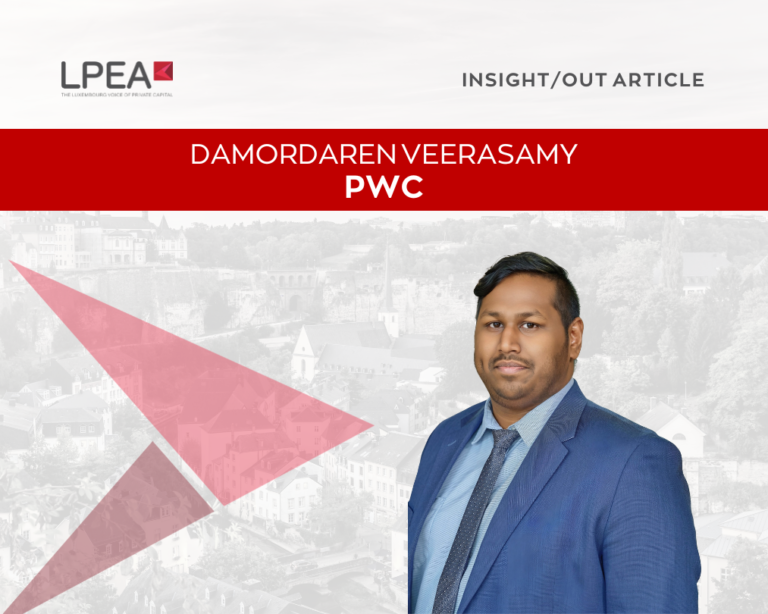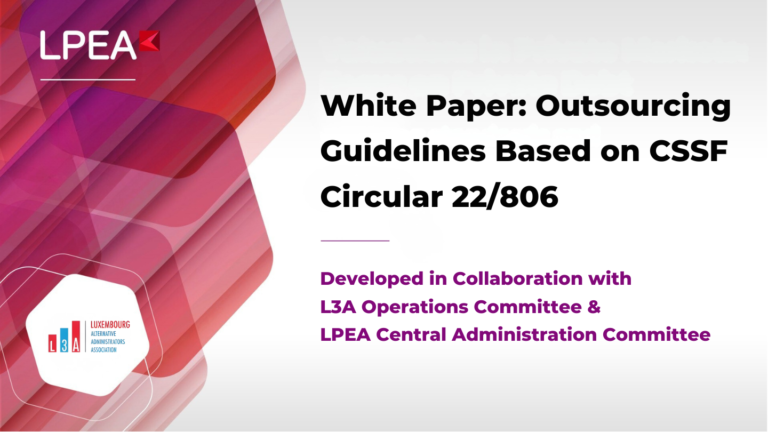Article by Bruno Bagnouls, Head of SPV Solutions and Luxembourg Business Development Leader, and Anastasia Greco, Head of Regulatory & Governance Services, at Alter Domus, as published in Insight/Out magazine #34.
Increasing regulatory oversight across private markets in Europe is impacting how managers thinking about their operational models, with non-core back-office functions becoming an essential enabler of front office capability.
Introduction
Launching an alternative fund has become much more complex than it used to be, with increasing regulation in Europe one of the primary drivers of the rising operational burden.
The origins of the alternative assets industry can be traced back to small, owner-managed partnerships of investment professionals. Compliance and regulatory reporting obligations were relatively minimal, and back-office functions tasked with regulatory compliance and reporting viewed as pure-cost centers with limited impact on the front office functions of raising and investing capital.
As the private markets assets under management expanded, however, so has regulatory oversight of the alternatives space, which in turn has fostered demand for greater transparency and regulatory reporting from alternative asset managers.
The implementation of the Alternative Investment Fund Managers Directive (AIFMD) in 2013, a regulatory framework for private markets industry brought forward by the European Commission, was the first major step on this regulatory trajectory, triggered by 2008 financial crisis.
Further regulation has followed subsequently and changed the capabilities alternative asset managers require to be effective, with regulatory and operational expertise as important as investment strategy and product development for long-term success in private markets.
Primary role of the AIFM
The growing importance of the partnering with the right Alternative Investment Fund Manager (AIFM) exemplifies how the alternative assets industry has had to adapt to a rising operational burden, and how back-office and front office functions have become increasingly interlinked.
AIFMs are regulated legal entities that have to be approved by European regulators and authorized under the AIFMD. AIFMs, often, handle portfolio and risk management for Alternative Investment Funds (AIF), and have come to play a crucial role in working with asset managers to dilute operational burden and control operational costs. Asset managers have the option of establishing an in-house AIFM, or work with third-party AIFM company to support with the daily management of funds.
In addition to risk and portfolio management, third-party AIFMs can also offer support with accounting and financial reporting, asset valuations, marketing and regulatory reporting. Working with an authorized AIFM can save a manager significant up-front set up costs and time, as well as supporting ongoing cost efficiency in the running of funds. Third-party AIFM providers will have the scale and expertise to develop and maintain digital portals, automated workflow tools and best-of-breed alternative assets software, that can be harnessed to handle rising operational workflows while keeping costs in check.
Working with an authorized AIFM also serves to reinforce investor trust in the resilience and functionality of an investment managers’ operational infrastructure, with LPs drawing comfort when funds are overseeing by recognized AIFMs with proven operational credentials.
The AIFM’s role now clearly extends well beyond a basic back-office cost center, with the AIFM now a key enabler for effective manager operations, long-term commercial sustainability and funds’ compliance.
Anti-money laundering and sustainability struck a blow
In addition to the far-reaching impact of the AIFMD, private markets managers have also had to respond to the requirements of the EU’s Anti-Money Laundering and Terrorist Financing Directive (AMLD IV) and Sustainable Finance Disclosure Regulation (SFDR).
Both pieces of regulation have demanded additional regulatory transparency and reporting from investment managers, and have also shaped the requirements of underlying LPs when it comes to the investor KYC.
The AMLD IV, in 2015, introduced extra obligations on managers to run detailed know-your-client (KYC) and anti-money laundering (AML) checks on investors. More recent regulation now requires managers to not only run KYC and AML reviews on investors, but also on investments (KYA), which was not mandatory previously. For the latter, the role of the AIFM is again crucial as investment managers often do not have relevant expertise and systems.
The SFDR, meanwhile, was introduced primarily as a disclosure regime, but has evolved into an investor proxy for a fund’s wider sustainability credentials, adding to the back-office workloads. Having recently introduced strict fund naming rules, fund managers had in some cases to rename their product which could disturb investors relations.
Data management as main challenge for regulatory compliance
Data quality and management has become key for investment managers in order to ensure that they have ready access to the necessary data in order to be compliant with SFDR and AML/CFT regulation and make the required disclosures.
Upgrading data management capability, and putting the necessary IT infrastructure in place to do so, is a regular bottleneck for investment managers as they move to improve and digitise their operations, and represents the next big operational challenge facing the alternative assets industry.
Digitalization of alternatives operations is being driven by investor expectations for more frequent, granular reporting, which requires tech-enablement to deliver, as well as another piece of regulation that AIFMs are having to contend with – the European Union’s Digital Operational Resilience Act (DORA).
Continuous improvement in technology requires appropriate budgeting and therefore should be prioritise by investment managers when partnering with regulated managers or service providers. The market has now seen an increase in assistance demands from in-house managers relying on top-tier service providers, as firms have become overwhelmed by the complex regulatory canvas and the lack of SME functions.
In general, the capabilities of service providers and external AIFMs in handling regulatory complexity with automation and a consistent model supported by appropriate staff, have became a central focus point when performing due diligence duties and exploring partnerships. To focus on core activities, investment managers should be very ambitious in their outsourcing model and invest into long-lasting relationships with firms investing in future-proof models rather than simple tick-the-box exercises to outsource operational tasks at the lowest cost.
The key takeaway
The rising regulatory burden that alternative asset managers now have to carry has had a direct impact on how investment managers think about their wider commercial strategies.
A private markets firm has evolved from an entity primarily focused on devising investment strategies and presenting investment products to investors, into a business that also has to have a grip on how regulation now influences not only new product development, but also the ongoing costs of meeting investor and regulatory expectations.
Entering new markets, meanwhile, has become a complex exercise, with investment managers having to navigate varying regulatory frameworks and requirements, especially when it comes to funds registration.
As operational models become more sophisticated in response to increasing operational burdens, managers are also having to address governance matters at board level as their organizations professionalise and become more institutional.
At every level, regulation is reshaping what private markets investment managers do and how they are run.
Conclusion
The complexity of regulatory framework governing private markets has reached a peak, and as investment managers look for ways to manage the costs of added regulation, and future-proof their operations, new operating models are emerging to meet the demands that will face the alternative assets managers of the future.
Outsourcing is likely to play an increasingly important role as investment managers make this transition. The rising investment required in technology and regulatory and compliance to keep pace with constantly evolving regulatory and investor demands will become ever more challenging for individual managers to bear on their own, broadening the scope of fund administrators and AIFM companies to step in and leverage their scale and geographic reach to offer investment managers with the necessary coverage and digital expertise at a more reasonable cost point.
To take up the challenge, AIFM and service providers must succeed in their digital and operational transformation to meet the demand, and remain Trusted Advisors for Investment Manager firms.




